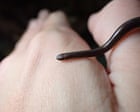
In a remarkable turn of events, the world’s smallest snake, known as the Barbados threadsnake, has been rediscovered on the island of Barbados. This rediscovery comes two decades after its last documented sighting, during which time many feared that the species had become extinct. Measuring a mere 10 centimeters in length and as slender as a strand of spaghetti, this unique species was found under a rock in the center of the island by a collaborative team from the Barbados Environment Ministry and the conservation organization Re:wild.
The discovery of the Barbados threadsnake is more than just an ecological victory; it represents a glimmer of hope for conservationists who aim to shed light on the often-overlooked smaller creatures in our ecosystem. This species is primarily found in rock crevices and under leaf litter, playing an essential role in maintaining the ecological balance by helping control insect populations. With urbanization and habitat loss threatening biodiversity worldwide, the threadsnake’s rediscovery emphasizes the importance of preserving natural habitats.
The Barbados threadsnake’s rediscovery adds to the narrative that even the smallest and seemingly inconspicuous creatures hold value in our global ecosystem. Efforts to protect this species are a reminder of the broader mission to safeguard lesser-known wildlife, whose preservation is vital for maintaining biodiversity. Conservation organizations plan to conduct further studies to better understand the habitat requirements and behaviors of the threadsnake, aiming to develop strategies that ensure its protection and survival.
In another realm of environmental advancement, discussions on artificial intelligence (AI) have taken center stage. The Autoridade da Concorrência, Portugal’s Competition Authority, has expressed concerns regarding agreements between AI firms that potentially hinder labor mobility. Such practices may infringe upon market competitiveness, which could inhibit innovation and progression within the sector.
Ensuring competitive practices in AI businesses is crucial for fostering an environment where innovation can thrive. The Competition Authority emphasizes that maintaining healthy mobility amongst professionals within the AI field encourages the cross-pollination of ideas, leading to technological advancements that benefit society as a whole. This stance encourages companies to revisit non-compete agreements and adopt policies that support open competition and innovation.
These developments in both ecological conservation and technological regulation highlight a shared understanding: protecting diversity, whether in ecosystems or markets, is essential for resilience and growth. The rediscovery of the Barbados threadsnake serves as a heartwarming reminder of nature’s resilience, much like the need for adaptable, dynamic approaches in rapidly evolving fields like artificial intelligence.
As we look forward to continued progress and prosperity, these stories inspire a collective commitment to safeguarding both our natural world and the innovative spirit that drives human development. Moving forward, collaboration and mindful practices in conservation and technology will be key to achieving a sustainable future for all species, great and small.
Source: {link}
